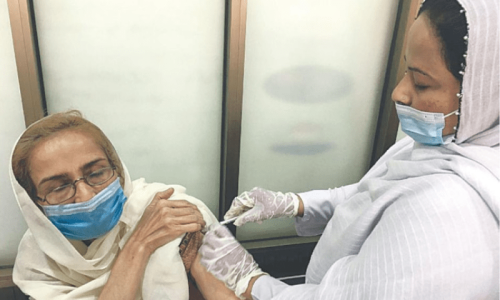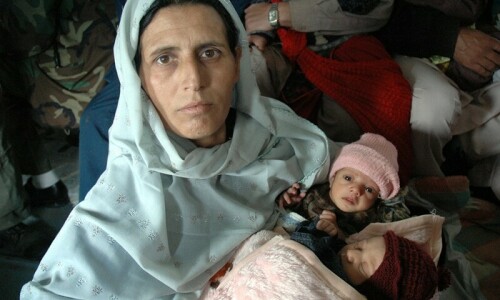THE health of women in Pakistan is in jeopardy. We are talking about the health of 120.7 million citizens of the country, ie, 50 per cent of the population, according to the 2023 census. It is the largest crisis within the broader crisis of overall healthcare in the country.
Women’s health suffers more than men’s health for two reasons: one, because of, unfortunately, the lower status of women in society; and two, because of their reproductive healthcare needs.
The lower status of women in society is indeed tragic. There are alarming disparities faced by women in every aspect of life at every age. One dubious distinction we have earned globally in 2024 is that out of 146 countries Pakistan has been ranked the second last in terms of gender gap. According to the 18th edition of the Global Gender Gap Report published this year, and produced since 2006 by the World Economic Forum, Pakistan’s gender gap index stands at 0.57.
The index ranges between zero and one. A country with no gender gap would have an index of one. It is calculated with the help of data across four important dimensions of women’s lives: economic participation and opportunity; educational attainment; health and survival; and political empowerment. The index, of course, is a way of reflecting the situation; the actual crisis is far worse. The reasons for the poor status of women in society are multidimensional, intricate and intertwined.
Lack of attention to the health of women, including their reproductive healthcare needs, is one of the causes as well as a consequence of women’s poor status. Poor health further weakens the ability of women to develop and to take charge of their lives. The poor health of the girl child lowers the chances of her education, which determines the course of the rest of her life. She becomes more prone to domestic violence and sexual abuse and follows a destiny decided by others in terms of an early marriage, the number of children she will have, and even decisions about her children’s lives.
The poor health of girls and women negatively affects their chances in life to become part of the workforce, be economically independent, participate in decision-making at all levels, assume leadership positions, and appropriately nurture the next generation. And as it happens, the broad base of this pyramid is firmly cemented in poverty. Poverty and disease are in a vicious relationship — one feeds on the other.
The precarious state of the health of women in Pakistan is evident throughout their life course.
The precarious health of women in Pakistan is evident throughout their life course. The quality of health information is generally poor in Pakistan, and gender disaggregation of health data is scant and of low quality. However, on the basis of what information is available, it is clear that women’s health in Pakistan is in bad shape. Let us look at the situation a bit more closely.
Around half of the 40pc of stunted children in Pakistan are girls. The percentage of children with low weight for their height (wasting) and low weight for their age (underweight) in Sindh is as high as 23.3pc and 41.3pc respectively — the highest figures among the four provinces. Half of these children are girls.
More than half the children under five years of age in Pakistan are anaemic, while 56.6pc of adolescent girls are anaemic. One in seven women (14.4pc) in the reproductive age bracket (15 to 49 years) is undernourished and as a result, underweight for her age. Sindh has the highest percentage (22.6pc) of underweight women. They give birth to underweight children who are malnourished and thus become stunted. About 41.7pc to 57pc of women in the reproductive age bracket are anaemic. Around 30pc deliveries are conducted by untrained birth attendants, and around 34pc of deliveries take place at home.
The total fertility rate in Pakistan is 3.6 births per woman. Mothers living in the rural areas, on average, bear one more child than mothers in the urban areas. This is one of the highest TFRs in Asia. The contraceptive prevalence rate is only 34pc among the currently married women from 15 to 49 years; 66pc are not using any contraceptive. Every fourth woman who undergoes childbirth also suffers from perinatal depression, which in 90pc of the cases remains untreated.
Pakistan has the highest rate of breast cancer in Asia. Every ninth woman is in danger of developing breast cancer. Years lived with disability due to breast cancer in girls and women aged 10 to 24 years in Pakistan are the highest in the world and the burden is increasing across female age groups.
Apart from reproductive health issues, women suffer due to communicable diseases and non-communicable diseases just as much as men, if not more, due to their weaker status.
Almost all the above conditions are preventable and can be managed effectively if diagnosed at an early stage. The situation of women’s poor health, as depicted by the abysmal indicators above, and many others, is embedded in societal and cultural norms and practices, patriarchy, poverty and the chronic neglect of women care. These are societal and systemic issues that require a comprehensive and sustained response.
Apart from the moral argument, this means huge social and economic opportunity losses which are difficult to quantify. However, two aspects of women’s lack of development are evident from the fact that only 23pc of women are part of the workforce in Pakistan and women and girls earn 10pc to 30pc less than men for the same work.
To improve women’s health, the overall healthcare system has to improve in terms of its governance, financing, responsiveness and delivery, while becoming more sensitive to women’s health needs. Gender biases in healthcare must be frontally addressed.
The writer is a former health minister and currently a professor of health systems & population health at Shifa Tameer-i-Millat University.
Published in Dawn, November 29th, 2024
















































Dear visitor, the comments section is undergoing an overhaul and will return soon.